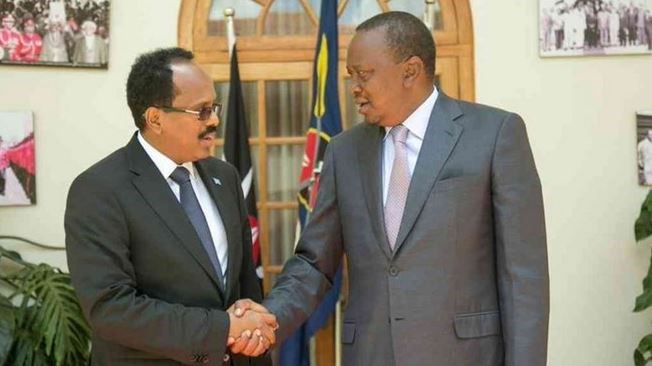
Sunday March 10, 2019

The diplomatic row between Kenya and Somalia over the latter’s alleged decision to auction disputed offshore oil blocks in the Indian Ocean appears to have been amicably resolved, if words of Somali officials is anything to go by.
Nairobi remains mum on the matter even after a meeting between President Uhuru Kenyatta and his Somali counterpart Mohamed Abdullahi Mohamed Farmajo on Wednesday.
This is the leaders’ first face-to-face talks since Kenya recalled her ambassador to Somalia on February 16 and expelled Somalia’s envoy in Nairobi over what the government termed as selling of offshore blocks to international “predatory bidders” in a London conference on February 7.
Didn’t acknowledge
President Kenyatta’s office didn’t also acknowledge the high-profile visit of President Farmajo and Ethiopian Prime Minister Abiy Ahmed after they traveled on the same plane and arrived in Nairobi on Tuesday.
However, quiet diplomacy to mediate between Kenya and Somalia was going on for some time. Abiy, who is the chairman of the regional bloc of Intergovernmental Authority on Development (Igad) had earlier held talks with President Kenyatta before hosting the Somali leader in Addis Ababa on Tuesday ahead of the trip to Nairobi.
“Through the leadership of PM Abiy Ahmed, @UKenyatta & @M_Farmaajo met this morning to discuss extensively on the source of the two countries dispute,” Prime Minister Abiy’s office said in a Twitter message on Wednesday. “As an outcome both agreed to work towards peace & to take measures in addressing particular issues that escalated the tensions.”
The Ethiopian Prime Minister’s office shared a photo of President Kenyatta and President Farmajo holding hands.
“The presidents (of Kenya and Somalia) agreed to restore and strengthen the relationship and cooperation of the two countries,” said a statement from President Farmajo’s office on Wednesday.
In an interview with the Sunday Standard, Abdinur Mohamed Ahmed, the director of communications at President Farmajo’s office, said Mogadishu’s three-week-long diplomatic spat with Kenya was amicably resolved and the Ambassadors of the two countries will return to their respective duty stations, although he gave no definite timeline for that.
“The two countries agreed to end their diplomatic row,” Ahmed said in a telephone interview from Mogadishu, adding that the Nairobi talks solely focused on Kenya’s “untrue” accusation that Somali auctioned oil blocks belonging to Kenya during the oil and gas conference in London.
Act of aggression
Somali government, which denied the allegation, struck a conciliatory tone on Tuesday, saying that the main objective of President Farmajo’s visit to Nairobi was “to restore and strengthen diplomatic relations with the Republic of Kenya.”
On February 16, Foreign Affairs PS Macharia Kamau termed the alleged Somali move an “act of aggression,” and “unparalled affront and illegal grab at the resources of Kenya.”
The dispute arose after Somalia’s Petroleum ministry last month launched a licensing round in a London conference organised by Spectrum Geo, a Norwegian company that provides seismic data to international oil and gas companies. Fifteen offshore blocks were offered during the bid round, which is expected to expire on July 11.
Spectrum Geo, which carried out two seismic surveys in Somali waters, also disputed Kenya’s claims, saying all its data were “wholly within the maritime territory of the Federal Government of Somalia and no data were acquired within the area currently the subject of the maritime delimitation case with Kenya.”
The maritime boundary dispute saw Somalia file a case against Kenya at the International Court of Justice.
Nairobi vehemently objected the move, saying the two countries, which in 2009 signed a memorandum of understanding on the issue, had other mechanisms to hammer out their differences without resorting to the UN’s highest court in The Hague.
Kenya’s objection was, however, dealt a blow in 2017 after the ICJ ruled that it has the right to hear the Somali case. For years, Kenya has been pushing for an out-of-court settlement to resolve the maritime boundary dispute with Somalia.
Court decision
“Our position is to let the court adjudicate the case,” Ahmed said, adding that the Somali government is ready to accept the court’s decision, which is expected sometime in 2020.
In a Facebook message, Ahmed wrote that Somalia “will not negotiate an inch of our land.”
A day before President Kenyatta’s meeting with his Somali counterpart, Somalia’s Permanent Mission to the United Nations sent a letter to all Permanent Missions to the UN in New York, refuting what it called “inaccurate statements” by Kenya that were earlier circulated among international diplomatic community about Somalia’s conduct in the disputed maritime areas between the two countries.
“Kenya has incorrectly claimed that Somalia is offering for bid oil and gas blocks located in the disputed areas,” said the Somalia letter dated March 5. “Kenya has moreover presented this unwarranted claim to all Diplomatic Missions and international Organisations accredited to Kenya via a note verbale dated February 22, 2019.”
Ahmed, the communications director, confirmed the authenticity of the Somali letters, but said: “They were sent before the Nairobi talks.”
On February 22, CS Juma briefed ambassadors of the United Nations Security Council member states in Nairobi on the Kenya-Somali maritime boundary dispute. She also briefed ambassadors of the AU Peace and Security Council member states on the matter.